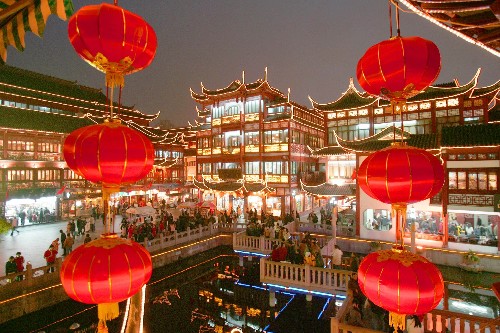
Chinese New Year starts with the New Moon on the first day of the new lunar year and ends on the full moon 15 days later. The 15th day of the new year is called the Lantern Festival, which is celebrated at night with lantern displays and children carrying lanterns in a parade.
The Chinese calendar is based on a combination of lunar and solar movements. The lunar cycle is about 29.5 days. In order to "catch up" with the solar calendar the Chinese insert an extra month once every few years (seven years out of a 19-yearcycle). This is the same as adding an extra day on leap year. This is why, according to the solar calendar, the Chinese New Year falls on a different date each year.
Even though the climax of the Chinese New Year, Nian, lasts only two or three days including the New Year's Eve, the New Year season extends from the mid-twelfth month of the previous year to the middle of the first month of the new year. A month from the New Year, it is a good time for business. People will pour out their money to buy presents, decoration material, food and clothing.
Transportation department, railroad in particular, is nervously waiting for the onslaught of swarms of travellers who take their days off around the New Year to rush back home for a family renunion from all parts of the country.
Days before the New Year, every family is busy giving its house a thorough cleaning, hoping to sweep away all the ill-fortune there may have been in the family to make way for the wishful in-coming good luck. People also give their doors and window-panes a new paint, usually in red color. They decorate the doors and windows with paper-cuts and couplets with the very popular theme of "happiness", "wealth", "longevity" and "satisfactory marriage with more children". Paintings of the same theme are put up in the house on top of the newly mounted wall paper. In the old days, various kinds of food are tributed at the alta of ancestors.
The Eve of the New Year is very carefully observed. Supper is a feast, with all members coming together. One of the most popular course is jiaozi, dumplings boiled in water. "Jiaozi" in Chinese literally mean "sleep together and have sons", a long-lost good wish for a family. After dinner, it is time for the whole family to sit up for the night while having fun playing cards or board games or watching TV programs dedicated to the occasion. Every light is supposed to be kept on the whole night. At midnight, the whole sky will be lit up by fireworks and firecrackers make everywhere seem like a war zone. People's excitement reach its zenith.
Very early the next morning, children greet their parents and receive their presents in terms of cash wrapped up in red paper packages from them. Then, the family start out to say greetings from door to door, first their relatives and then their neighbors. It is a great time for reconciliation. Old grudges are very easily cast away during the greetings. The air is permeated with warmth and friendliness. During and several days following the New Year's day, people are visiting each other, with a great deal of exchange of gifs. The New Year atmosphere is brought to an anti-climax fifteen days away where the Festival of Lanterns sets in. It is an occasion of lantern shows and folk dances everywhere. One typical food is the Tang Yuan, another kind of dumplings made of sweet rice rolled into balls and stuffed with either sweet or spicy fillings.
The Lantern Festival marks the end of the New Year season and afterwards life becomes daily routines once again. This description is based upon the recollection of my own experience. Customs of observing the New Year vary from place to place, considering that China is a big country not only geographically, but also demographically and ethnically. Yet, the spirit underlying the diverse celebrations of the Chinese New Year is the same: a sincere wish of peace and happiness for the family members and friends.
|

